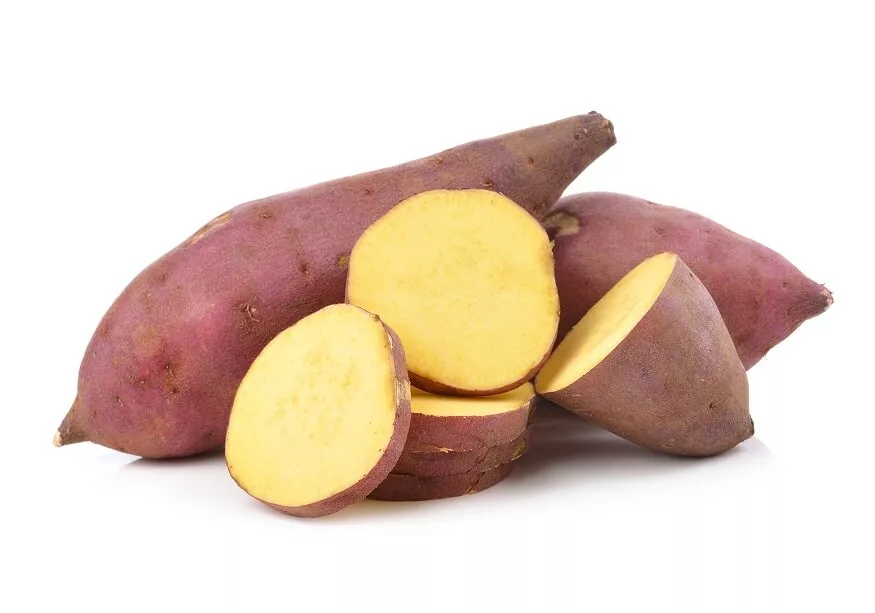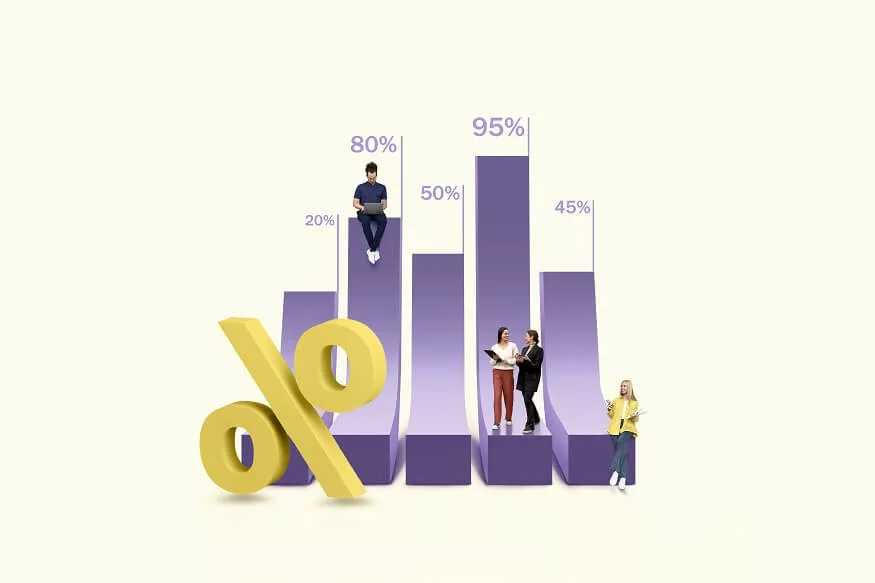Sweet potatoes are a healthy and enjoyable addition to a child’s meals because of their attractive orange colour and naturally sweet taste. This natural starchy sweet food will become a favourite for kids if added regularly to their diet. The nutrients in these superfoods help your cute little ones grow and develop.
What are Sweet Potatoes:
Sweet potatoes (Ipomoea batatas) belong to the family of Convolvulaceae and are well known for their rich flavour and nutritional benefits. They originated from Central and South America but are now cultivated worldwide.
There are various colours of sweet potatoes, like orange, purple, and white. The orange sweet potatoes, in particular, are renowned for their high beta-carotene content, which is like a parent to vitamin A. This makes sweet potato superfoods a good choice to boost healthy eyesight and immune function in children.
Nutrients in sweet potato:
Sweet potatoes are nutrient-rich foods, which means with fewer calories they provide a substantial amount of vitamins, minerals, and antioxidants. Let’s look into the vital nutrients and health benefits of sweet potatoes:
- Vitamin A: Sweet potatoes are rich in vitamin A in the form of beta-carotene. If one is worried about a lack of proper vision, then sweet potatoes will help them as Vitamin A is necessary for good eyesight, skin, and mucous membranes.
- Vitamin C: Sweet potatoes contain vitamin C, which is an antioxidant that supports the immune system and helps in the intake of iron from plant-based foods.
- Fiber: Sweet potatoes are a good source of dietary fiber. Fiber in sweet potatoes improves the digestive system, as it helps in the regular bowel motions, and creates a feeling of fullness, so your kid doesn’t ask for those junk foods, this in turn helps in weight management.
- Potassium: Potassium is important for protecting the right muscle and nerve features, and also to regulate blood pressure. Sweet potatoes offer a mild amount of this vital mineral.
- Vitamin B6: Vitamin B6 is important for brain development and function, as well as the synthesis of neurotransmitters. We all know that cognitive development in children is very important, this Vitamin B6 plays a major role in it.
- Manganese: Manganese is a hint mineral found in sweet potatoes that performs a position in bone formation, blood clotting, and the metabolism of vitamins.
- Vitamin E: Do you know about the antioxidant that helps protect cells from oxidative damage? It is called Vitamin E. While sweet potatoes are not extremely high in vitamin E, they contribute to overall antioxidant intake.
- Folate (Vitamin B9): Folate is essential for cell division and the production of DNA. It is very important during pregnancy to prevent neural tube defects in babies.
- Iron: Sweet potatoes contain some iron, which is very much needed for transporting oxygen throughout our human body. While plant-based iron (non-heme iron) is less readily absorbed than heme iron from animal sources, pairing sweet potatoes with vitamin C-rich foods can enhance iron absorption.
- Calcium: Sweet potatoes provide a modest amount of calcium, which is essential for children’s bone and teeth development. Still, parents should not completely depend on this one starchy food as the primary source of calcium for their cute little ones.
- Antioxidants: Sweet potatoes are filled with various antioxidants, such as beta-carotene, anthocyanins (in those beautiful purple sweet potatoes), and other phytonutrients. These compounds help us to nullify the effects of harmful free radicals, which reduces the dangers of chronic diseases.
Also Read : Healthy Snacking for Kids: Nutrient-packed snack ideas and their importance in the overall diet
Health Benefits of Sweet Potato for Children:
Including nutrients in sweet potatoes into a child’s diet can offer several health benefits, which will definitely surprise you:
- Vision Health: To maintain a healthy vision for the kids, the high beta-carotene content in sweet potatoes is very much needed. It is specifically critical for children’s eye improvement and reducing the chance of Vitamin A deficiency associated with eye troubles.
- Immune Support: Vitamins A and C in sweet potatoes support the immune system, helping the body fight off infections and illnesses.
- Digestive Health: The fiber in sweet potatoes promotes healthy digestion, reduces the risk of constipation, and supports the growth of beneficial gut bacteria.
- Brain Development: Vitamin B6 is crucial for brain development and function in children. Including sweet potatoes in their diet can aid in cognitive development.
- Weight Management: The combination of fiber and moderate calorie content in sweet potatoes can help children feel full and satisfied, reducing the possibility of overeating.
- Bone Health: For bone fitness in our body calcium and manganese are very much needed. This makes sweet potatoes a valuable addition to a baby’s weight loss program for healthy bones and teeth.
- Antioxidant Protection: The antioxidants in candy potatoes help protect cells from oxidative harm, doubtlessly decreasing the danger of continual diseases later in lifestyles.
- Healthy Skin: Vitamin A and antioxidants support healthy skin, which in turn reduces the risk of skin problems in children.
- Iron Absorption: Mixing sweet potatoes with vitamin C-rich foods, such as citrus fruits or broccoli, can improve the absorption of nonheme iron, helping in the prevention of iron-deficiency anemia.
Also Read: Childhood Malnutrition: Global perspective, causes, and interventions
How to Include Sweet Potatoes into a Child’s Diet
Training children to enjoy sweet potatoes can be both fun and rewarding. Here are some creative and tasty ways to incorporate these superfoods into their meals:
- Baked Sweet Potato Fries: Slice sweet potatoes into thin strips, toss with a bit of olive oil and seasoning, and bake until it turns crispy, this crispy nature will make the kids fall in love and they make a healthier alternative to regular fries.
- Sweet Potato Mash: Mash cooked sweet potatoes with a touch of butter or yogurt for a creamy and naturally sweet side dish.
- Sweet Potato Pancakes: Add mashed sweet potatoes to pancake batter for a delightful twist on traditional pancakes. Top with fresh fruit and a drizzle of maple syrup.
- Sweet Potato Toast: Slice sweet potatoes into thin rounds and toast them until they are slightly crispy. Top with avocado, peanut butter, or your child’s favourite toppings.
- Sweet Potato Soup: Blend cooked sweet potatoes with vegetable broth and seasonings to make a creamy and comforting soup.
- Sweet Potato Smoothies: Add cooked and cooled sweet potato cubes to fruit smoothies for a creamy texture and a nutritional boost.
- Stuffed Sweet Potatoes: Hollow out cooked sweet potatoes and fill them with a mixture of vegetables, beans, and cheese for a wholesome meal.
- Sweet Potato Quesadillas: Layer mashed sweet potatoes, black beans, and cheese between tortillas and cook until crispy.
- Sweet Potato and Apple Salad: Mix chopped sweet potatoes with apples, raisins, and a yogurt-based dressing for a sweet and savoury salad.
- Sweet Potato Desserts: Create sweet potato-based desserts like pies, muffins, or cookies. Kids would love these desserts, instead of the usual sugar-filled chocolates.
Considerations and Precautions:
While there are so many nutrients in sweet potatoes, also there are a few considerations and precautions to keep in mind when adding them to a child’s diet:
- Allergies: Some children may have allergies to sweet potatoes or other foods. Introduce them gradually and watch for any adverse reactions.
- Portion Size: Ensure that sweet potatoes are part of a balanced diet, and be mindful of portion sizes to avoid excessive calorie intake.
- Texture: Depending on the age of the child, consider the texture of sweet potato dishes. Younger children may prefer softer textures, while older children may enjoy crispy preparations.
- Variety: Though these starchy sweet potatoes are nutritious, it’s important to offer a variety of foods for your cute little ones as it would ensure a well-rounded diet.
- Dental Health: Sweet potatoes can be sticky and may adhere to teeth, potentially contributing to dental issues. Encourage your child to rinse their mouth or brush their teeth after eating.
- Allergic Reactions: In rare cases, sweet potatoes can cause allergic reactions. If you see any signs of an allergy (such as hives, swelling, or difficulty breathing), consult with a doctor immediately.
Also Read : Vegetarian and Vegan Diets in Childhood: Ensuring comprehensive nutrition without animal products
Conclusion:
At EuroSchool we teach our students about the importance of a healthy diet in their day to day lives and encourage the parents to provide kids with nutrition rich food and superfoods like sweet potato, beans, and broccoli. Their high vitamin A content, with other vital nutrients and antioxidants, helps your little ones in many ways. By cooking creative and tasty recipes in your kitchen that include sweet potatoes, parents can encourage children to enjoy the numerous health benefits that these root vegetables offer.
Disclaimer:
The information provided on this website is not a substitute for professional medical advice.
EuroSchool encourages you to consult with a qualified healthcare professional for any health
concerns you may have. The information on this website is not intended to diagnose, treat,
cure, or prevent any disease.










